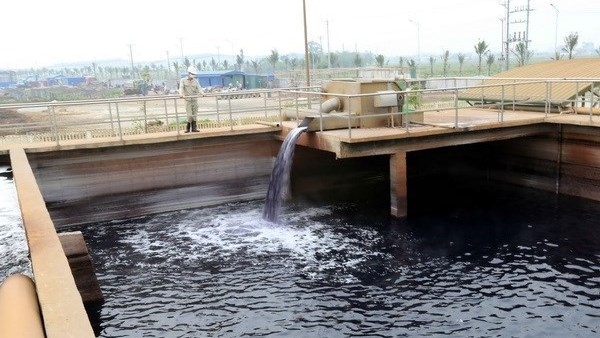
The Vietnamese Government, ministries and localities always welcome advanced and environmental-friendly waste treatment technologies at reasonable prices, Deputy Prime Minister Trinh Dinh Dung has said.

Illustrative image
(Source: VNA)
Deputy PM Dung made the statement while receiving Sebastian
Rose, sales director of Germany’s
INTEC company, which has 30-year experience in industrial waste treatment, in Hanoi on June 11.
After being introduced to the German
company’s technology to turn solid waste into gas and energy, the Deputy PM
lauded the INTEC’s idea of investing in a waste-to-energy plant in Vietnam, saying
the country is in need of modern and suitable waste treatment technologies to
protect the environment.
However, he held that modern technology
is normally expensive and not suitable to the condition of Vietnam as most
of the technologies require waste classification.
Currently, waste in Vietnam is
basically treated by burying, which is harmful to the environment. Meanwhile,
the pilot of other technologies following the models applied in many countries
was not successful due to failure in waste classification, he noted, adding
that high price is another concern of Vietnam.
He asked the Ministry of Science and
Technology to coordinate with other ministries and sectors to verify and assess
economic-technical indications of the waste-to-energy technology of INTEC
company.
The Ministry of Industry and Trade was
assigned to work with relevant ministries and agencies to calculate the price
of power provided by solid waste-to-energy plants.
Deputy PM Dung also underscored the need to
design specific projects for pilot implementation, while reminding enterprises
to consider the possibility of producing lines and equipment domestically to
reduce costs.
Source: NDO
According to data from the Hoa Binh Provincial Party Committee, the industrial production index for the first six months of 2025 is estimated to have increased by 20% compared to the same period last year. This marks the highest year-on-year growth rate for this period since 2020.
In the first six months of 2025, Hoa Binh province’s export turnover was estimated at 1.145 billion USD, marking an 18.11% increase compared to the same period in 2024. Import turnover was estimated at $ 804 million, a 17.15% increase, which helped the province maintain a positive trade balance.
The lives of the ethnic minority farmers in Tan Lac district have gradually improved thanks to the new directions in agricultural production. This is a testament to the collective strength fostered through the professional associations and groups implemented by various levels of the district’s Farmers’ Union.
With the motto the "product quality comes first,” after nearly one year of establishment and operation, Muong village’s Clean Food Agricultural and Commercial Cooperative, located in Cau Hamlet, Hung Son Commune (Kim Boi district), has launched reputable, high-quality agricultural products to the market that are well-received by consumers. The products such as Muong village’s pork sausage, salt-cured chicken, and salt-cured pork hocks have gradually carved out a place in the market and they are on the path to obtaining the OCOP certification.
In the past, the phrase "bumper harvest, rock-bottom prices" was a familiar refrain for Vietnamese farmers engaged in fragmented, small-scale agriculture. But today, a new spirit is emerging across rural areas of Hoa Binh province - one of collaboration, organisation, and collective economic models that provide a stable foundation for production.
Maintaining growing area codes and packing facility codes in accordance with regulations is a mandatory requirement for agricultural products to be eligible for export. Recently, the Department of Agriculture and Environment of Hoa Binh province has intensified technical supervision of designated farming areas and packing facilities to safeguard the "green passport" that enables its products to access international markets.



